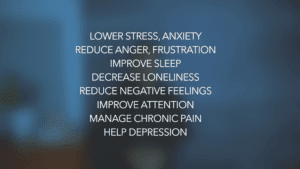I am sure you are already familiar with the many benefits of mindfulness practice. It has become popular in the last few years, and for a good reason – it is helpful!
Mindfulness meditation and practices are certainly not new – they are based on Buddhist, Vipsanna (insight), and Zen practices. They were introduced into the West in the 70’s and have been adopted by psychology, positive psychology, Mindfulness Based Stress Reduction (MBSR), and many other therapeutic programs.
What’s great about mindfulness practices is that once you know the basic ideas, you can practice it anywhere and anytime.
What is mindfulness?
Mindfulness is purposely bringing your attention into the present moment. We can bring our attention to the body, the breath, the mind, a certain thought, a mantra or short phrase, or a sensation that we are experiencing. When we are in a mindful state we can:
- lower stress, anxiety, tension, excessive emotions

- improve sleep quality
- reduce/manage blood pressure
- manage digestive health
- reduce feelings of loneliness
- reduce negative thinking
- improve concentration and focus
- manage chronic pain and illness
- improve brain health
Qigong and Mindfulness
Mindfulness practices usually are done while sitting in a quiet space and focusing on the breath. Constantly bringing your attention back to the present. It can be practiced in many different ways. Qigong is actually a mindfulness practice.
During Qigong practice we can be present by focusing on the body, the posture, the alignment, tension and relaxation in the muscles. We can also follow the breath, in all its different qualities. As well, we can pay attention to the mind, the thoughts, our intentions, and what we are focusing on.
So there are many opportunities to practice mindfulness during Qigong!
Remember “this” while Practicing Mindfulness
In this live video, I discussed something to remember while practicing mindfulness. That is that mindfulness doesn’t ‘make you’ feel anything. It doesn’t make you relaxed, happy, peaceful, joyful or any other emotion. All it does, is help you feel present.
When you are present then you have the opportunity to use your body and mind’s natural healing ability, and you inner wisdom to help yourself.
This may mean help your self to heal, help yourself to see clearly, or to gather insight.
In the video I discussed the concern that sometimes people feel as if mindfulness “doesn’t work.” If the expectation is that it should make us feel a certain way – then yes, mindfulness may not “work.” But, if the intention is to be present, in the here and now, then mindfulness practice always works ?
Learn more about Mindfulness
 One can read books, and spend a lifetime exploring the subtleties of mindfulness – it is a worthy endeavour! If you are interested in learning more about mindfulness practices from many experts, you may enjoy the Magical Mindfulness Virtual Retreat.
One can read books, and spend a lifetime exploring the subtleties of mindfulness – it is a worthy endeavour! If you are interested in learning more about mindfulness practices from many experts, you may enjoy the Magical Mindfulness Virtual Retreat.
The free event begins on May 31, 2020 and features around 20 different experts, discussing different ways to practice mindfulness. I was a guest and had a casual interview that will air on June 4, 2020. If you would like to attend, click the link below and it will take you to a sign up page, and you will be notified when it begins.
Keep healthy, keep you qi moving smoothly, and spend a little time being Present!
~Jeff
If you are looking for more Qigong videos we have some here: https://www.qigongforvitality.com/category/daily-qigong-routines/ or you can come join the Communi Qi for many more ?

